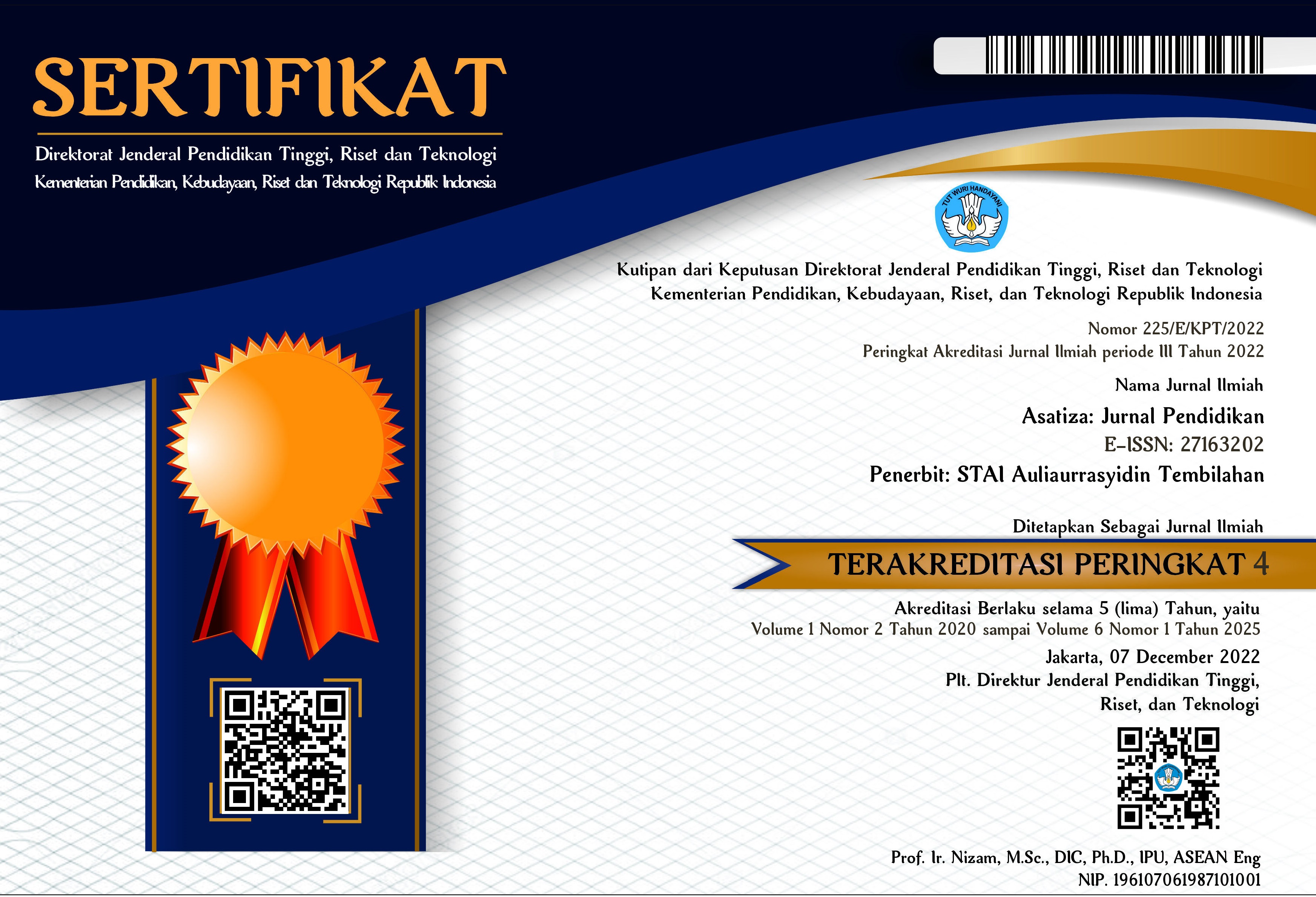Philosophy of Striving and Making a Living in Institutions of Traditional Studies
DOI:
https://doi.org/10.46963/asatiza.v3i2.490Keywords:
Pondok, Ta'alim Al-Muta'allim, Value of Life, SustenanceAbstract
Institutions of traditional learning (pondok) are often considered as places to acquire the sciences of the hereafter. On the other hand, the statement seems to illustrate that the students brought up in the institution are not concerned with worldly matters. The learning curriculum is said not to care about the function of the mind but instead makes students passive and only follow what is presented by the teacher. Using a content analysis approach, this study pays attention to the content of the book Ta’alim Al-Muta’allim written by Imam Al-Zarnuji. This book is a guide for the citizens of traditional educational institutions whether in terms of curriculum, aspects of teaching and learning, and ethics of life. The main objective of this study is to see whether the use of the book can influence positive thinking and lifestyle that not only think about the question of the hereafter but also perform the responsibilities that need to be fulfilled in the world. The results of the study found that the content of the book not only focuses on educational practice, but also encourages students to earn a living but with good intentions, especially to increase knowledge. In other words, students are not taught to sideline worldly affairs but still need to be aware of worldly affairs but with a high awareness that every job must be based on the importance of worship and be able to meet the needs of the hereafter.
Downloads
References
Adi, M. F., & Satiman, A. (2015). Sifat wara’ dalam pendidikan menurut Imam Al-Zarnuji. E–JPI, E-Jurnal Penyelidikan dan Inovasi, 2(1), 19-29. http://rmc.kuis.edu.my/jpi/jilid-ii-isu-i-april-2015/
Ali, M. (2011). Sistem pendidikan pesantren menurut Nurcholish Madjid. Unpublish Paper, Program Studi Pendidikan Agama Islam Jurusan Tarbiyah. Purwokerto. Sekolah Tinggi Agama Islam Negeri Purwokerto.
Aljufri, A. K. (1995). Terjemah Ta’lim Muta’allim. Surabaya: Mutiara Ilmu .
Az-Zarnuji, B. (2020). Cahaya Bagi Penuntut Ilmu. Rawang: Pustaka Ilmuwan.
Bruinessen, M. V. (2012). Kitab Kuning, Pesantren dan Tarekat. Yogyakarta: Gading Publishing.
Chey, E. (2019, October 26). Cross-Referencing: A Research Tool to Lay Out a Project’s “Center” and “Periphery”. Clear Voice , p. Blog.
Ghani, R. A., Marzuki, N. A., Yusof, R., Mustaffa, C. S., Rofie, M. K., Rahman, M. N., et al. (2011). Penelitian tentang pandangan ibu bapa dan majikan terhadap lepasan sekolah agama. International Conference on Islamic Civilization and Malay Identity 2011 (ICICMI 2011). Equatorial Hotel, Melaka 14-16 November 2011, 1-5.
Hulawa, D. E. (2018). Al-Zarnuji’s character concept in strengthening character education in indonesia. Jurnal Pendidikan Islam , 4(2), 25-40. https://doi.org/10.15575/jpi.v4i2.2395
Isnin, M. H., & Abdullah, A. H. (2020). Pendidikan pondok sebagai sebuah institusi pengajian tafsir al-quran di Negeri Johor. In B. Kassim, A. K. Ali, M. Abdullah, & N. '. Kamri (Eds.), Pemberdayaan Jaringan Strategik Ummah: Melakar Kecemerlangan Masa Hadapan (1-20). Shah Alam: Persatuan Ulama Malaysia.
Jaafar, N., Ghani, Z. A., Tibek, S. R., Nor, A. H., Gunardi, S., Ismail, N. A., et al. (2017). Challenges of pondok educational institution and it’s impact on students development. Journal of Islamic, Social, Economics and Development, 2(6), 223-235. http://www.jised.com/archived.asm
Maslani, M., Suntiah, R., Yasniwarti, Y., & Nurulhaq, D. (2017). Al-Zarnuji’s thought of education and its implementation at pesantren. Jurnal Pendidikan Islam, 3(2), 179-190. https://doi.org/10.15575/jpi.v3i2.1312
Mastuhu. (1994). Dinamika Sistem Pendidikan Pesantren. Jakarta: INIS.
Mudakir, A. S. (2017). Pengaruh pembelajaran kitab Ta’lim Al-Muta’allim terhadap pembentukan karakter dan prestasi belajar santri. Jurnal Ilmiah AL-Jauhari: Jurnal Studi Islam Dan Interdisipliner, 2(1), 211-241. https://doi.org/10.30603/jiaj.v2i2.681
Muhadjir, N. (2011). Metodologi Penelitian Kualitatif. Yogyakarta: Rake Sarasin.
Muthohar, A. (2007). Ideologi Pendidikan Pesantren. Semarang: Pustaka Rizki Putra.
Nata, A. (2003). Pemikiran Para Tokoh Pendidikan Islam Seri Kajian Filsafat Pendididikan Islam . Jakarta: Rajagrafindo Persada.
Sodiman. (2013). Etos Belajar dalam Kitab Ta'alim Al-Muta'allim Thaariq Al-Ta'allum karya Imam Al-Zarnuji. Al-Ta'dib: Jurnal Kajian Ilmu Kependidikan, 6(2), 56-72. http://dx.doi.org/10.31332/atdb.v6i2.305
Zin, S. M., Azizan, N. I., Ismail, N., & Zainuddin, N. F. (2021). Penerimaan Pelajar Terhadap Sistem Pengajian Turath Di Pondok Moden: Satu Tinjauan. In A. S. Nzly, M. Yahaya, R. Zakaria, & M. R. Mohamad (Eds.), Pengajian Tahfiz Al-Quran Dan Al-Qiraat Siri 1 2021, 168-182. Kajang: Fakulti Pengajian Peradaban Islam (FPPI), KUIS.
Downloads
Published
Issue
Section
License
Authors who publish with this journal agree to the following terms:
1. Copyright on any article is retained by the author(s).
2. The author grants the journal, right of first publication with the work simultaneously licensed under a Creative Commons Attribution shareAlike 4.0 International License that allows others to share the work with an acknowledgment of the work’s authorship and initial publication in this journal.
3. Authors are able to enter into separate, additional contractual arrangements for the non-exclusive distribution of the journal’s published version of the work (e.g., post it to an institutional repository or publish it in a book), with an acknowledgment of its initial publication in this journal.
4. Authors are permitted and encouraged to post their work online (e.g., in institutional repositories or on their website) prior to and during the submission process, as it can lead to productive exchanges, as well as earlier and greater citation of published work.
5. The article and any associated published material is distributed under the Creative Commons Attribution-ShareAlike 4.0 International License











2.png)



